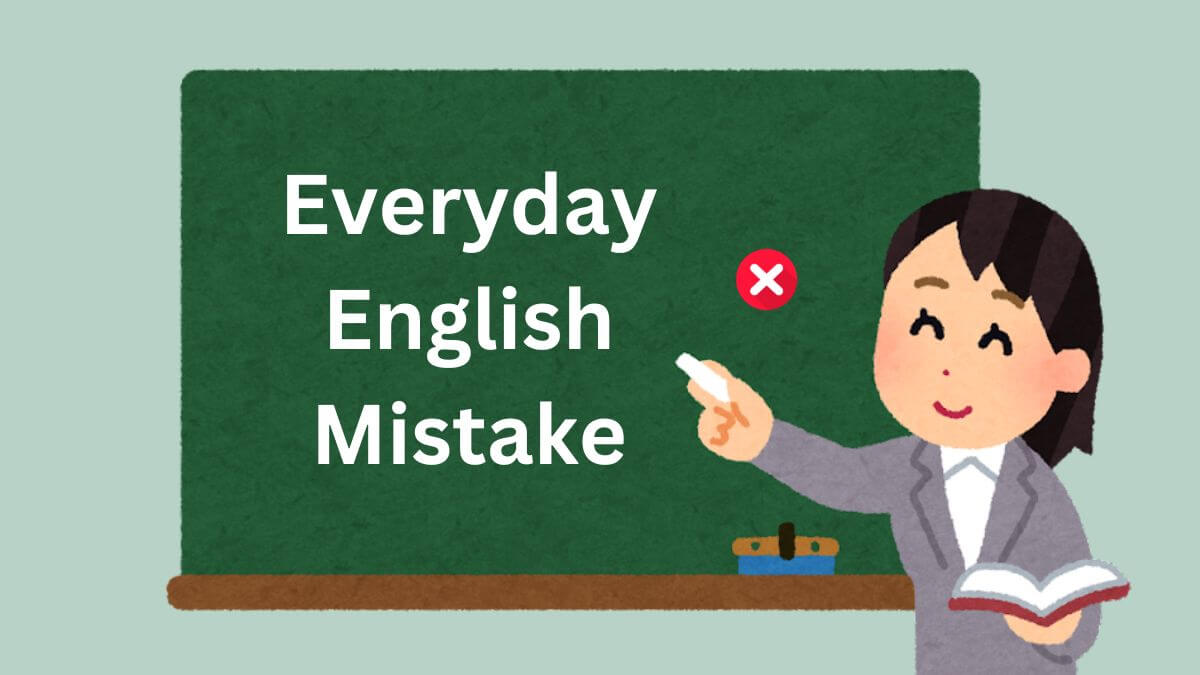Have you ever said something in English and wondered later, “Wait… was that correct?” Don’t worry—you’re not alone. Many English learners (and even native speakers!) make simple grammar mistakes without realizing it.
Everyday English Mistakes
These everyday slip-ups can confuse your listener or weaken your message. In this blog post, we will uncover 7 everyday English mistakes or common English mistakes that people say all the time—and more importantly, we’ll show you how to fix them. If you want to sound more confident, fluent, and professional in English, this guide is for you!
1. I didn’t knew it → I didn’t know it
Why it’s wrong: After did, we always use the base form of the verb—not the past tense.
✅ Correct Examples:
- I didn’t knew the answer. (incorrect)
- I didn’t know the answer. (correct)
- She didn’t went to school. (incorrect)
- She didn’t go to school. (correct)
- We didn’t saw the movie. (incorrect)
- We didn’t see the movie. (correct)
- They didn’t ate anything. (incorrect)
- They didn’t ate anything. (correct)
- They didn’t ate anything. (incorrect)
- They didn’t ate anything. (correct)
2. He do / She go → He does / She goes
Why it’s wrong: For he, she, it, we must use the -s form (does, goes, etc.).
Correct Examples:
- He do the dishes (incorrect)
- He does the dishes. (correct)
- She go to the gym (incorrect)
- She goes to the gym. (correct)
- It look good. (incorrect)
- It looks good. (correct)
- My brother play cricket. (incorrect)
- My brother plays cricket. (correct)
- She teach math. (incorrect)
- She teaches math.(correct)
3. I am having a mobile → I have a mobile
Why it’s wrong: Use have (not am having) for possession or ownership.
Correct Examples:
- I am having a Motorcycle. (incorrect)
- I have a Motorcycle. (correct)
- She is having three brothers. (incorrect)
- She has three brothers. (correct)
- We are having a new house. (incorrect)
- We have a new house. (correct)
- He is having a pet dog. (incorrect)
- He has a pet dog. (correct)
- They are having lots of time. (incorrect)
- They have lots of time. (correct)
4. More better → Better
Why it’s wrong: Better is already a comparative adjective. You don’t need more.
Correct Examples:
- This idea is more better. (incorrect)
- This idea is better. (correct)
- Your English is more better now. (incorrect)
- Your English is better now. (correct)
- I feel more better today. (incorrect)
- I feel better today. (correct)
- This phone is more better than mine. (incorrect)
- This phone is better than mine. (correct)
- Her performance was more better than his.(incorrect)
- Her performance was better than his. (correct)
5. Discuss about → Discuss
Why it’s wrong: Discuss is a transitive verb—it doesn’t need the word about.
Correct Examples:
- We need to discuss about the issue. (incorrect)
- We need to discuss the issue. (correct)
- Let’s discuss about the plan. (incorrect)
- Let’s discuss the plan. (correct)
- They discussed about politics. (incorrect)
- They discussed politics. (correct)
- Can we discuss about the details? (incorrect)
- Can we discuss the details? (correct)
- She discussed about her job. (incorrect)
- She discussed her job. (correct)
Read More Article:
6. According to me → In my opinion
Why it’s wrong: According to refers to other sources, not your personal opinion.
Correct Examples:
- Correct Examples: (incorrect)
- In my opinion, he’s wrong. (correct)
- According to me, we should leave. (incorrect)
- I think we should leave. (correct)
- According to me, it’s easy. (incorrect)
- In my view, it’s easy. (correct)
- According to me, this is best. (incorrect)
- I believe this is the best. (correct)
- According to me, you’re right. (incorrect)
- In my opinion, you’re right. (correct)
7. Cope up with (Anything) → Cope with (Anything)
Why it’s wrong: The correct phrase is cope with—no need to add up.
Correct Examples:
- I can’t cope up with the pressure. (incorrect)
- I can’t cope with the pressure. (correct)
- She’s coping up with stress. (incorrect)
- She’s coping with stress. (correct)
- How do you cope up with problems? (incorrect)
- How do you cope with problems? (correct)
- He couldn’t cope up with the changes. (incorrect)
- He couldn’t cope with the changes. (correct)
- They are trying to cope up with the loss. (incorrect)
- They are trying to cope with the loss. (correct)
Final Tips for Perfect English
Speak slowly and clearly to avoid repeating bad habits. Listen to native speakers and imitate natural patterns. Use grammar-checking tools for feedback. Read blogs like EnglishGrammarWay.com regularly!
Practice correcting your own mistakes using examples like the ones above.
Conclution
These everyday grammar mistakes may seem harmless, but they can seriously hurt your fluency and confidence. By reviewing examples and correcting these habits, you will sound more natural, more professional, and more correct.
Bookmark EnglishGrammarWay.com for more clear, practical grammar guides. Want a downloadable checklist or a quiz based on these errors? Let me know – I will create one for you next! Thanks…
